笔记43 Spring Web Flow——订购披萨应用详解
一、项目的目录结构
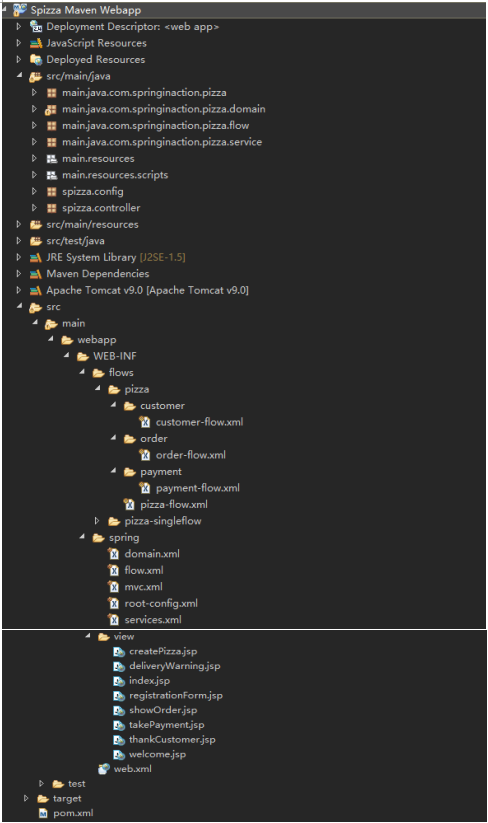
二、订购流程总体设计
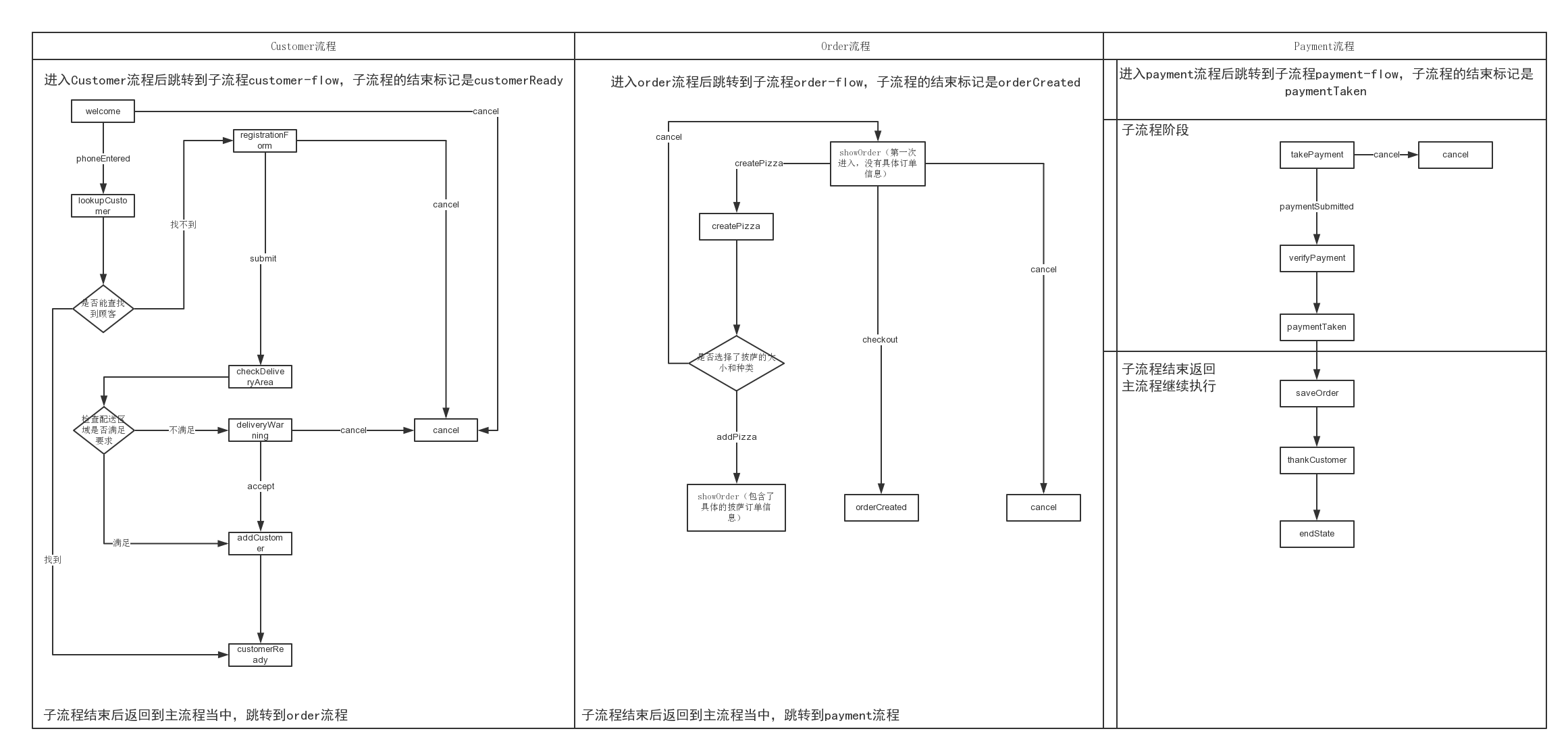
三、订购流程的详细设计
1.定义基本流程pizza-flow.xml
<?xml version="1.0" encoding="UTF-8"?>
<flow xmlns="http://www.springframework.org/schema/webflow"
xmlns:xsi="http://www.w3.org/2001/XMLSchema-instance"
xsi:schemaLocation="http://www.springframework.org/schema/webflow
http://www.springframework.org/schema/webflow/spring-webflow-2.0.xsd"> <var name="order" class="main.java.com.springinaction.pizza.domain.Order"/> <!-- Customer -->
<subflow-state id="customer" subflow="customer-flow">
<input name="order" value="order"/>
<transition on="customerReady" to="order" />
</subflow-state> <!-- Order -->
<subflow-state id="order" subflow="order-flow">
<input name="order" value="order"/>
<transition on="orderCreated" to="payment" />
</subflow-state> <!-- Payment -->
<subflow-state id="payment" subflow="payment-flow">
<input name="order" value="order"/>
<transition on="paymentTaken" to="saveOrder"/>
</subflow-state> <action-state id="saveOrder">
<evaluate expression="pizzaFlowActions.saveOrder(order)" />
<transition to="thankCustomer" />
</action-state> <view-state id="thankCustomer">
<transition on="end" to="endState" />
</view-state> <!-- End state -->
<end-state id="endState" /> <global-transitions>
<transition on="cancel" to="endState" />
</global-transitions>
</flow>
在进入主流程时,必须先新建一个Order的实例,Order类会带有关于订单的所有信息,包含顾客信息、订购的披萨列表以及支付详情。然后进入Customer流程,对应的子流程为customer-flow,而且在进入子流程前,必须将订单对象作为子流程的输入进行传递,如果子流程结束的<end-state>状态ID为customerReady,那么当执行完子流程后就会跳转到名为order的状态。接下来,先介绍customer子流程。
2.子流程customer-flow.xml
<?xml version="1.0" encoding="UTF-8"?>
<flow xmlns="http://www.springframework.org/schema/webflow"
xmlns:xsi="http://www.w3.org/2001/XMLSchema-instance"
xsi:schemaLocation="http://www.springframework.org/schema/webflow
http://www.springframework.org/schema/webflow/spring-webflow-2.0.xsd"> <input name="order" required="true"/> <!-- Customer -->
<view-state id="welcome">
<transition on="phoneEntered" to="lookupCustomer"/>
<transition on="cancel" to="cancel"/>
</view-state> <action-state id="lookupCustomer">
<evaluate result="order.customer" expression=
"pizzaFlowActions.lookupCustomer(requestParameters.phoneNumber)" />
<transition to="registrationForm" on-exception=
"main.java.com.springinaction.pizza.service.CustomerNotFoundException" />
<transition to="customerReady" />
</action-state> <view-state id="registrationForm" model="order" popup="true" >
<on-entry>
<evaluate expression=
"order.customer.phoneNumber = requestParameters.phoneNumber" />
</on-entry>
<transition on="submit" to="checkDeliveryArea" />
<transition on="cancel" to="cancel" />
</view-state> <decision-state id="checkDeliveryArea">
<if test="pizzaFlowActions.checkDeliveryArea(order.customer.zipCode)"
then="addCustomer"
else="deliveryWarning"/>
</decision-state> <view-state id="deliveryWarning">
<transition on="accept" to="addCustomer" />
<transition on="cancel" to="cancel" />
</view-state> <action-state id="addCustomer">
<evaluate expression="pizzaFlowActions.addCustomer(order.customer)" />
<transition to="customerReady" />
</action-state> <!-- End state -->
<end-state id="cancel" />
<end-state id="customerReady" />
</flow>
第一个进入的流程是由<view-state>定义的“welcome”视图状态,即用户欢迎界面,需要用户输入电话号码,具体如下图所示,

在welcome状态中有两个用<transition>定义的转移,如果触发了phoneEntered事件,即用户输入电话号码,然后点击Lookup Customer按钮后,会跳转到由<action-state>定义的lookupCustomer行为状态,对用户输入的电话号码进行查询。进入到lookupCustomer状态后,首先使用<evaluate>元素计算了一个表达式(SpEL表达式),将计算结果放在order对象的customer变量中。计算过程就是调用pizzaFlowActions(调用的时候首字母小写)类中的lookupCustomer方法,输入参数就是用户输入的电话号码,通过requestParameters.phoneNumber得到。在lookupCustomer中状态的转移是通过抛出异常触发的,因为如果通过电话号码找不到顾客,说明这个顾客是新客户,需要进行信息登记,所以就会抛出自定义异常CustomerNotFoundException,用来触发下一个流程——用户注册。相反,如果通过电话号码找到了用户,则说明是老顾客,那么就直接跳转到customerReady状态,即第一个Customer流程随之结束,跳转到下一个流程——Order。进入由<view-state>定义的registrationForm视图状态后,首先通过设置<view-state>的model属性为表单绑定order对象,具体如下图所示,
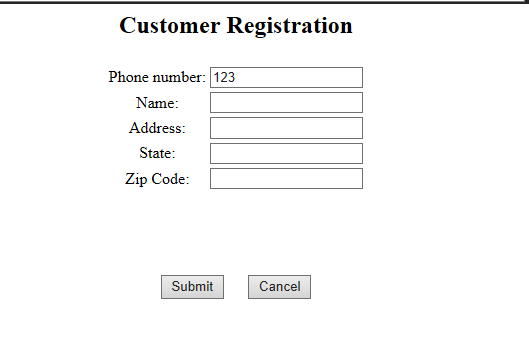
然后使用<on-entry>进行切入,即进入registrationForm状态后,先获取前一个页面用户输入的电话号码,通过requestParameters.phoneNumber得到,然后赋值给order.customer.phoneNumber。当用户输入完全部信息后,点击Submit按钮就会通过<transition>进行状态转移,转移到checkDeliveryArea状态中。如果点击Cancel就会返回首页。checkDeliveryArea是一个由<decision-state>定义的决策状态,通过表达式的值确定下一步的转移方向,表达式是通过调用pizzaFlowActions类中checkDeliveryArea方法对邮编进行判断。如果表达式结果为ture则转移到then属性指定的addCustomer状态中,如果为false,则转移到else属性指定的deliveryWarning状态中。deliveryWarning状态是由于用户所填写的地址超出配送范围,需要用户到店自取,判断用户是否接受这个请求,具体如下图所示。

如果用户点击Accept则会跳转到addCustomer状态中,点击cancel就会返回首页。addCustomer状态是一个行为状态,使用表达式将刚注册的用户信息进行保存,然后跳转到customerReady状态,即子流程的结束状态,最后返回到主流程中,第一个customer流程执行完毕,跳转到order流程。
同样进入到order流程后,会跳转到子流程order-flow,也会需要一个订单对象作为输入。如果子流程结束的<end-state>状态ID为orderCreated,那么子流程执行完毕会跳转到payment状态。具体的流程下面进行详细介绍。
3.子流程order-flow.xml
<?xml version="1.0" encoding="UTF-8"?>
<flow xmlns="http://www.springframework.org/schema/webflow"
xmlns:xsi="http://www.w3.org/2001/XMLSchema-instance"
xsi:schemaLocation="http://www.springframework.org/schema/webflow
http://www.springframework.org/schema/webflow/spring-webflow-2.0.xsd"> <input name="order" required="true" /> <!-- 接收order作为输入 --> <!-- Order -->
<view-state id="showOrder"><!-- 展现order的状态 -->
<transition on="createPizza" to="createPizza" />
<transition on="checkout" to="orderCreated" />
<transition on="cancel" to="cancel" />
</view-state> <view-state id="createPizza" model="flowScope.pizza"> <!-- 创建披萨的状态 -->
<on-entry>
<set name="flowScope.pizza"
value="new main.java.com.springinaction.pizza.domain.Pizza()" />
<evaluate result="viewScope.toppingsList"
expression="T(main.java.com.springinaction.pizza.domain.Topping).asList()" />
</on-entry>
<transition on="addPizza" to="showOrder">
<evaluate expression="order.addPizza(flowScope.pizza)" />
</transition>
<transition on="cancel" to="showOrder" />
</view-state> <!-- End state -->
<end-state id="cancel" /> <!-- 取消的结束状态 -->
<end-state id="orderCreated" /> <!-- 创建订单的结束状态 -->
</flow>
首先进入showOrder状态,其中包含三个可以进行转移的状态:createPizza,orderCreated,cancel。showOrder是一个视图状态,对应的页面如下图所示:
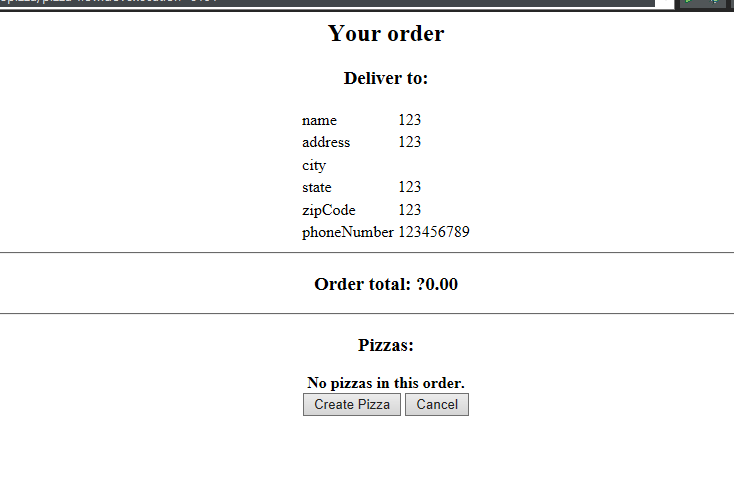
当用户点击Create Pizza按钮后,触发createPizza状态,因为createPizza页面中也有表单,所以先设置model属性进行表单与pizza对象进行绑定。需要注意的是这里的pizza对象的作用域范围是flow,即当流程开始时创建,在流程结束时销毁。只有在创建它的流程中是可见的。在进入createPizza流程后,先设置两个变量。第一个变量是pizza,作用域是flow,通过<set>设置,用于保存pizza信息,当表单提交时,表单的内容会填充到该对象中。需要注意的是,这个视图状态引用的model是流程作用域内的同一个Pizza对象。第二个是toppingsList,作用域是view,即当进入视图状态时创建,当这个状态退出时销毁,只在视图状态内时可见的,所以flow>view。toppingsList是用来保存披萨的种类的。具体的createPizza对应的页面如下所示:
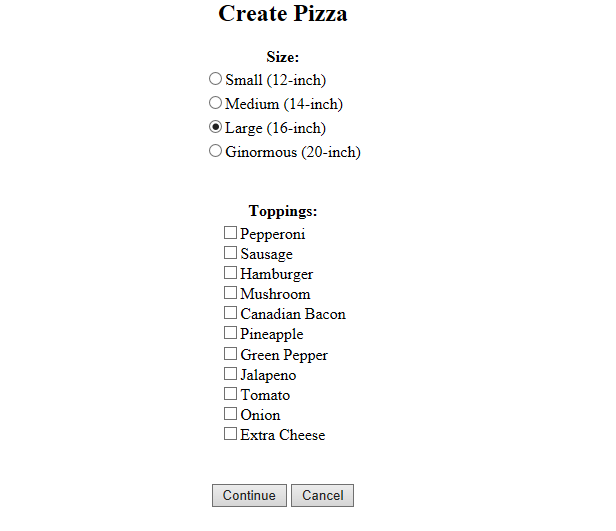
当用户选择完披萨的大小和种类后,点击Continue按钮后,通过触发addPizza进入到视图showOrder,在重新进入showOrder视图的时候,将刚才填充完毕的pizza对象加入到order对象当中,现在的order就不为空了,具体如下图所示:
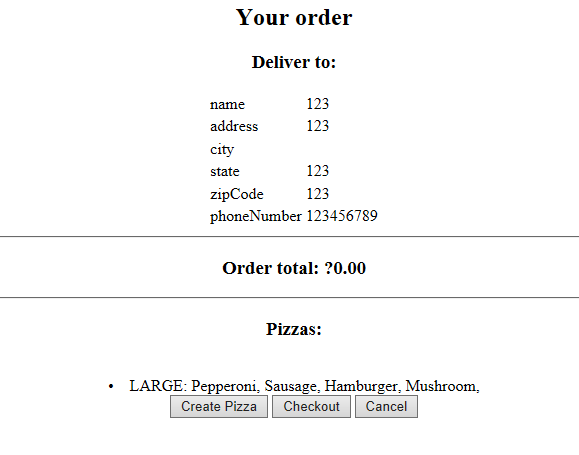
当用户点击Checkout按钮时,转移到orderCreated状态,意味着order子流程的结束,需要跳转到payment流程。下面再对payment流程进行介绍。
4.子流程payment-flow.xml
<?xml version="1.0" encoding="UTF-8"?>
<flow xmlns="http://www.springframework.org/schema/webflow"
xmlns:xsi="http://www.w3.org/2001/XMLSchema-instance"
xsi:schemaLocation="http://www.springframework.org/schema/webflow
http://www.springframework.org/schema/webflow/spring-webflow-2.0.xsd"> <input name="order" required="true"/> <view-state id="takePayment" model="flowScope.paymentDetails">
<on-entry>
<set name="flowScope.paymentDetails"
value="new main.java.com.springinaction.pizza.domain.PaymentDetails()" />
<evaluate result="viewScope.paymentTypeList"
expression="T(main.java.com.springinaction.pizza.domain.PaymentType).asList()" />
</on-entry>
<transition on="paymentSubmitted" to="verifyPayment" />
<transition on="cancel" to="cancel" />
</view-state> <action-state id="verifyPayment">
<evaluate result="order.payment" expression=
"pizzaFlowActions.verifyPayment(flowScope.paymentDetails)" />
<transition to="paymentTaken" />
</action-state> <!-- End state -->
<end-state id="cancel" />
<end-state id="paymentTaken" />
</flow>
首先进入takePayment流程当中,先初始化两个变量。一个是flow级作用域的paymentDetails,另一个是view级的paymentTypeList。takePayment对应的页面如下所示:
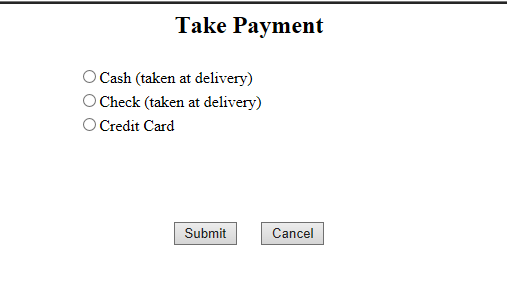
当用户点击Submit触发paymentSubmitted,然后转移到verifyPayment行为状态。verifyPayment主要是通过调用pizzaFlowActions类的verifyPayment方法对用户的支付类型进行判断。最后转移到paymentTaken状态,意味着子流程结束,返回到主流程中。
主流程中和payment相关的流程还有一个行为状态saveOrder,顾名思义将上述流程创建的订单进行保存,然后转移到thankCustomer状态。thankCustomer界面如下所示:

当点击finish就又跳转到首页,重新开始整个流程。
四、具体实现
Spring Web Flow 就是 Spring Web MVC 的一个扩展,如果粗略一些来讲,所谓 flow 就相当于 Spring Web MVC 中一种特殊的 controller ,这种 controller 可通过 XML 文件加以配置。所以必须对Spring Web MVC进行配置,然后再定义相应的flow。
(一)通过Java来配置SpringMVC,但是flow不能通过java配置,必须通过xml来进行配置。使用Java配置的目的是显示欢迎页面。
1.在src/main/java目录下分别创建两个包,一个是spizza.config用来配置SpringMVC,另一个是spizza.controller用来配置控制器。目录结构如下所示:
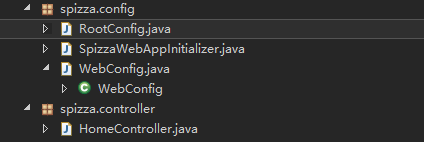
RootConfig.java
package spizza.config; import org.springframework.context.annotation.ComponentScan;
import org.springframework.context.annotation.ComponentScan.Filter;
import org.springframework.context.annotation.Configuration;
import org.springframework.context.annotation.FilterType;
import org.springframework.web.servlet.config.annotation.EnableWebMvc; @Configuration("RootConfig")
@ComponentScan(basePackages = { "spizza" }, excludeFilters = {
@Filter(type = FilterType.ANNOTATION, value = EnableWebMvc.class) })
public class RootConfig { }
SpizzaWebApplnitializer.java
package spizza.config;
import org.springframework.web.servlet.support.AbstractAnnotationConfigDispatcherServletInitializer;
public class SpizzaWebAppInitializer extends AbstractAnnotationConfigDispatcherServletInitializer {
@Override
protected Class<?>[] getRootConfigClasses() {
// TODO Auto-generated method stub
return new Class<?>[] { RootConfig.class };
}
@Override
protected Class<?>[] getServletConfigClasses() {
// TODO Auto-generated method stub
return new Class<?>[] { WebConfig.class };
}
@Override
protected String[] getServletMappings() {
// TODO Auto-generated method stub
return new String[] { "/" };
}
}
WebConfig.java
package spizza.config; import org.springframework.context.annotation.Bean;
import org.springframework.context.annotation.ComponentScan;
import org.springframework.context.annotation.Configuration;
import org.springframework.web.servlet.config.annotation.DefaultServletHandlerConfigurer;
import org.springframework.web.servlet.config.annotation.EnableWebMvc;
import org.springframework.web.servlet.config.annotation.WebMvcConfigurerAdapter;
import org.springframework.web.servlet.view.InternalResourceViewResolver; @Configuration("WebConfig")
@EnableWebMvc
@ComponentScan("spizza.controller")
public class WebConfig extends WebMvcConfigurerAdapter {
@Bean
public InternalResourceViewResolver viewResolver() {
InternalResourceViewResolver resolver = new InternalResourceViewResolver();
resolver.setPrefix("/WEB-INF/view/");
resolver.setSuffix(".jsp");
resolver.setViewClass(org.springframework.web.servlet.view.JstlView.class);
resolver.setExposeContextBeansAsAttributes(true);
return resolver;
} @Override
public void configureDefaultServletHandling(DefaultServletHandlerConfigurer configurer) {
// TODO Auto-generated method stub
configurer.enable();
} }
HomeController.java
package spizza.controller; import org.springframework.stereotype.Controller;
import org.springframework.web.bind.annotation.RequestMapping;
import org.springframework.web.bind.annotation.RequestMethod; @Controller
public class HomeController {
public HomeController() {
} @RequestMapping(value = "welcome", method = RequestMethod.GET)
public String home() {
return "index";
}
}
通过Java来配置SpringMVC也是一种复习回顾,Spring实战中推荐使用Java配置。
2.运行结果:

(二)配置Spring Web Flow
在WEB-IN目录下创建spring文件夹,用来存放有关flow的配置,在WEB-IN目录下创建flows文件夹,用来存放具体的flow流程。具体目录结构如下所示:
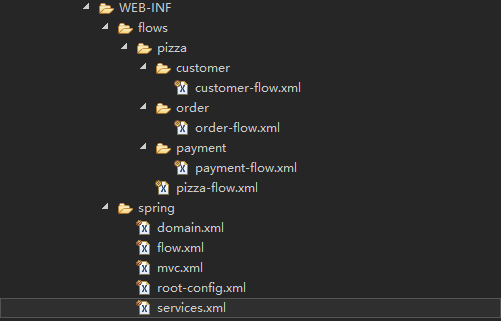
1.基础配置,将不同作用的配置文件分开,然后在root-config.xml中进行导入。
flow.xml
<?xml version="1.0" encoding="UTF-8"?>
<beans xmlns="http://www.springframework.org/schema/beans"
xmlns:xsi="http://www.w3.org/2001/XMLSchema-instance" xmlns:flow="http://www.springframework.org/schema/webflow-config"
xmlns:p="http://www.springframework.org/schema/p" xmlns:context="http://www.springframework.org/schema/context"
xsi:schemaLocation="
http://www.springframework.org/schema/beans
http://www.springframework.org/schema/beans/spring-beans-4.0.xsd
http://www.springframework.org/schema/context
http://www.springframework.org/schema/context/spring-context-3.0.xsd
http://www.springframework.org/schema/webflow-config
http://www.springframework.org/schema/webflow-config/spring-webflow-config.xsd"> <context:component-scan base-package="main.java.com.springinaction.pizza.flow" /> <!-- 执行流程:进入Spring Web Flow系统的入口点 -->
<flow:flow-executor id="flowExecutor" /> <!-- 所有 flow 定义文件位置在此配置, flow-builder-services 用于配置 flow 的特性 -->
<flow:flow-registry id="flowRegistry"
flow-builder-services="flowBuilderServices">
<flow:flow-location path="/WEB-INF/flows/pizza/pizza-flow.xml"
id="pizza-flow" />
<flow:flow-location path="/WEB-INF/flows/pizza/customer/customer-flow.xml"
id="customer-flow" />
<flow:flow-location path="/WEB-INF/flows/pizza/order/order-flow.xml"
id="order-flow" />
<flow:flow-location path="/WEB-INF/flows/pizza/payment/payment-flow.xml"
id="payment-flow" />
</flow:flow-registry>
<!--Web Flow 中的视图通过 MVC 框架的视图技术来呈现 -->
<flow:flow-builder-services id="flowBuilderServices"
view-factory-creator="mvcViewFactoryCreator" />
<!-- 指明 MVC 框架的 view resolver ,用于通过 view 名查找资源 -->
<bean id="mvcViewFactoryCreator"
class="org.springframework.webflow.mvc.builder.MvcViewFactoryCreator">
<property name="viewResolvers" ref="viewResolver" />
</bean> </beans>
mvc.xml
<?xml version="1.0" encoding="UTF-8"?>
<beans xmlns="http://www.springframework.org/schema/beans"
xmlns:xsi="http://www.w3.org/2001/XMLSchema-instance"
xsi:schemaLocation="http://www.springframework.org/schema/beans
http://www.springframework.org/schema/beans/spring-beans.xsd">
<bean id="viewResolver"
class="org.springframework.web.servlet.view.InternalResourceViewResolver">
<property name="viewClass"
value="org.springframework.web.servlet.view.JstlView">
</property>
<property name="prefix" value="/WEB-INF/view/">
</property>
<property name="suffix" value=".jsp">
</property>
</bean>
<bean id="viewMappings"
class="org.springframework.web.servlet.handler.SimpleUrlHandlerMapping">
<!-- /pizza-flow.do 请求由 flowController 来处理 -->
<property name="mappings">
<value> /pizza-flow.do=flowController </value>
</property>
</bean>
<bean id="flowController" class="org.springframework.webflow.mvc.servlet.FlowController">
<property name="flowExecutor" ref="flowExecutor" />
</bean>
</beans>
domain.xml,加载流程中需要的bean。
<?xml version="1.0" encoding="UTF-8"?> <beans xmlns="http://www.springframework.org/schema/beans"
xmlns:xsi="http://www.w3.org/2001/XMLSchema-instance"
xmlns:context="http://www.springframework.org/schema/context"
xsi:schemaLocation="http://www.springframework.org/schema/beans
http://www.springframework.org/schema/beans/spring-beans-4.0.xsd
http://www.springframework.org/schema/context
http://www.springframework.org/schema/context/spring-context-3.1.xsd"> <context:spring-configured /> <bean id="order" class="main.java.com.springinaction.pizza.domain.Order" abstract="true">
<property name="pricingEngine" ref="pricingEngine" />
</bean> </beans>
services.xml,加载流程中需要的bean。
<?xml version="1.0" encoding="UTF-8"?> <beans xmlns="http://www.springframework.org/schema/beans"
xmlns:xsi="http://www.w3.org/2001/XMLSchema-instance"
xsi:schemaLocation="http://www.springframework.org/schema/beans
http://www.springframework.org/schema/beans/spring-beans-2.0.xsd"> <bean id="pricingEngine"
class="main.java.com.springinaction.pizza.service.PricingEngineImpl" /> <!--
<lang:groovy id="pricingEngineGroovy"
script-source="classpath:scripts/PricingEngineImpl.groovy" />
--> <bean id="customerService"
class="main.java.com.springinaction.pizza.service.CustomerServiceImpl" /> <!-- Payment processing bean, as discussed on page 606 -->
<bean id="paymentProcessor"
class="main.java.com.springinaction.pizza.service.PaymentProcessor" /> <bean id="orderService"
class="main.java.com.springinaction.pizza.service.OrderServiceImpl" /> </beans>
root-config.xml
<?xml version="1.0" encoding="UTF-8"?>
<beans xmlns="http://www.springframework.org/schema/beans"
xmlns:xsi="http://www.w3.org/2001/XMLSchema-instance" xmlns:context="http://www.springframework.org/schema/context"
xsi:schemaLocation="http://www.springframework.org/schema/beans http://www.springframework.org/schema/beans/spring-beans-4.0.xsd
http://www.springframework.org/schema/context http://www.springframework.org/schema/context/spring-context-3.1.xsd"> <context:component-scan base-package="main.java.com.springinaction.pizza" />
<import resource="domain.xml" />
<import resource="flow.xml" />
<import resource="mvc.xml" />
<import resource="services.xml" /> </beans>
web.xml,虽然以及使用Java配置过Servlet,参考SpizzaWebAppInitializer.java,但是为了执行flow,还需要在web.xml中进行相应的配置。
<web-app xmlns:xsi="http://www.w3.org/2001/XMLSchema-instance"
xmlns="http://xmlns.jcp.org/xml/ns/javaee"
xsi:schemaLocation="http://xmlns.jcp.org/xml/ns/javaee http://xmlns.jcp.org/xml/ns/javaee/web-app_3_1.xsd"
id="WebApp_ID" version="3.1">
<servlet>
<servlet-name>CartServlet</servlet-name>
<servlet-class>org.springframework.web.servlet.DispatcherServlet</servlet-class>
<init-param>
<param-name>contextConfigLocation</param-name>
<param-value>
/WEB-INF/spring/root-config.xml
</param-value>
</init-param>
<load-on-startup>1</load-on-startup>
</servlet>
<servlet-mapping>
<servlet-name>CartServlet</servlet-name>
<url-pattern>*.do</url-pattern>
</servlet-mapping>
</web-app>
2.Flow的定义
整个顾客订购披萨的过程可以分为三个部分,第一部分就是顾客相关信息验证以及查询,第二个部分是订单的创建,第三个部分是支付。所以不应该将全部的流程都放在一个文件中进行定义,应该分别定义为子流程,然后在主流程中进行调用。具体内容参照第三小节。
(三)视图,只给出了主要内容。
1.index.jsp
<h1>Hello!</h1><br/>
<a href="pizza-flow.do">Spizza</a>
2.welcome.jsp
<h2 align="center">Welcome to Spizza!!!</h2>
<form:form>
<table align="center">
<tr>
<td>phoneNumber</td>
<td><input type="hidden" name="_flowExecutionKey"
value="${flowExecutionKey}" /> <input type="text"
name="phoneNumber" /><br /></td>
</tr>
<tr height="80px"></tr>
<tr>
<td colspan="2" align="center"><input type="submit" name="_eventId_phoneEntered"
value="Lookup Customer" /></td>
</tr>
</table>
</form:form>
<!-- 首先要注意的是隐藏的“_flowExecutionKey”输入域。
当进入视图 状态时,流程暂停并等待用户采取一些行为。
赋予视图的流程执行 key(flow execution key)就是一种返回流程的“回程票”(claim ticket)。
当用户提交表单时,流程执行key会 在“_flowExecutionKey”输入域中返回并在流程暂停的位置进行恢 复。
-->
3.registrationForm.jsp
<h2 align="center">Customer Registration</h2>
<form:form commandName="order">
<table align="center">
<tr>
<td><input type="hidden" name="_flowExecutionKey"
value="${flowExecutionKey}" /></td>
</tr>
<tr>
<td align="center">Phone number:</td>
<td><form:input path="customer.phoneNumber" /></td>
</tr>
<tr>
<td align="center">Name:</td>
<td><form:input path="customer.name" /></td>
</tr>
<tr>
<td align="center">Address:</td>
<td><form:input path="customer.address" /></td>
</tr>
<tr>
<td align="center">State:</td>
<td><form:input path="customer.state" /></td>
</tr>
<tr>
<td align="center">Zip Code:</td>
<td><form:input path="customer.zipCode" /></td>
</tr>
<tr height="80px"></tr>
<tr>
<td colspan="2" align="center"><input type="submit"
name="_eventId_submit" value="Submit" />
<input type="submit" name="_eventId_cancel" value="Cancel" /></td>
</tr>
</table>
</form:form>
4.deliveryWarning.jsp
<h2>Delivery Unavailable</h2>
<p>The address is outside of our delivery area. The order may still be taken for carry-out.</p>
<a href="${flowExecutionUrl}&_eventId=accept">Accept</a> |
<a href="${flowExecutionUrl}&_eventId=cancel">Cancel</a>
5.showOrder.jsp
<div align="center">
<h2>Your order</h2> <h3>Deliver to:</h3>
<table>
<tr>
<td>name</td>
<td>${order.customer.name}</td>
</tr>
<tr>
<td>address</td>
<td>${order.customer.address}</td>
</tr>
<tr>
<td>city</td>
<td>${order.customer.city}</td>
</tr>
<tr>
<td>state</td>
<td>${order.customer.state}</td>
</tr>
<tr>
<td>zipCode</td>
<td>${order.customer.zipCode}</td>
</tr>
<tr>
<td>phoneNumber</td>
<td>${order.customer.phoneNumber}</td>
</tr>
</table>
<hr />
<h3>
Order total:
<fmt:formatNumber type="currency" value="${order.total}"></fmt:formatNumber> </h3>
<hr />
<h3>Pizzas:</h3> <c:if test="${fn:length(order.pizzas) eq 0}">
<b>No pizzas in this order.</b>
</c:if> <br />
<table border="1">
<tr>
<th>Size</th>
<th>Toppings</th>
<th>IsCombo</th>
<th>Price</th>
</tr>
<c:forEach items="${order.pizzas }" var="pizza">
<tr>
<td align="center">${pizza.size}</td>
<td align="center">
<c:forEach items="${pizza.toppings}" var="topping">
<c:out value="${topping}" />
</c:forEach>
</td>
<td align="center">${pizza.isCombo }</td> <td>${pizza.price }</td>
</tr>
</c:forEach>
</table> <form:form>
<input type="hidden" name="_flowExecutionKey"
value="${flowExecutionKey}" />
<input type="submit" name="_eventId_createPizza" value="Create Pizza" />
<c:if test="${fn:length(order.pizzas) gt 0}">
<input type="submit" name="_eventId_checkout" value="Checkout" />
</c:if>
<input type="submit" name="_eventId_cancel" value="Cancel" />
</form:form>
</div>
6.createPizza.jsp
<div align="center">
<h2>Create Pizza</h2>
<form:form commandName="pizza" >
<input type="hidden" name="_flowExecutionKey"
value="${flowExecutionKey}" />
<b>Size: </b>
<br />
<table>
<tr>
<td><form:radiobutton path="size" label="Small (12-inch)——————¥6.99"
value="SMALL" /></td>
</tr>
<tr>
<td><form:radiobutton path="size" label="Medium (14-inch)——————¥7.99"
value="MEDIUM" /></td>
</tr>
<tr>
<td><form:radiobutton path="size" label="Large (16-inch)——————¥8.99"
value="LARGE" /></td>
</tr>
<tr>
<td><form:radiobutton path="size" label="Ginormous (20-inch)——————¥9.99"
value="GINORMOUS" /></td>
</tr>
</table>
<br />
<br />
<b>Toppings: PRICE_PER_TOPPING 0.20¥</b>
<br />
<table>
<tr>
<td>
<form:checkboxes name="topping" path="toppings" items="${toppingsList}"
delimiter="<br/>" />
</td>
</tr>
</table>
<br />
<br />
<b>Hyperchannel</b>
<table>
<tr>
<td><form:checkbox path="specialPizza" label="MEAT"
value="MEAT" /></td>
</tr>
<tr>
<td><form:checkbox path="specialPizza" label="VEGGIE"
value="VEGGIE" /></td>
</tr>
<tr>
<td><form:checkbox path="specialPizza" label="THEWORKS"
value="THEWORKS" /></td>
</tr>
</table>
<input type="submit" class="button" name="_eventId_addPizza"
value="Continue" />
<input type="submit" class="button" name="_eventId_cancel"
value="Cancel" />
</form:form>
</div>
7.takePayment.jsp
<div align="center">
<script>
function showCreditCardField() {
var ccNumberStyle = document.paymentForm.creditCardNumber.style;
ccNumberStyle.visibility = 'visible';
}
function hideCreditCardField() {
var ccNumberStyle = document.paymentForm.creditCardNumber.style;
ccNumberStyle.visibility = 'hidden';
}
</script>
<h2>Take Payment</h2>
<form:form commandName="paymentDetails" name="paymentForm">
<table>
<tr>
<td><input type="hidden" name="_flowExecutionKey"
value="${flowExecutionKey}" /></td>
</tr>
<tr>
<td><form:radiobutton path="paymentType" value="CASH"
label="Cash (taken at delivery)" onclick="hideCreditCardField()" /></td>
</tr>
<tr>
<td><form:radiobutton path="paymentType" value="CHECK"
label="Check (taken at delivery)" onclick="hideCreditCardField()" /></td>
</tr>
<tr>
<td><form:radiobutton path="paymentType" value="CREDIT_CARD"
label="Credit Card" onclick="showCreditCardField()" /></td>
<td><form:input path="creditCardNumber"
cssStyle="visibility:hidden;" /></td>
</tr>
<tr height="80px"></tr>
<tr>
<td colspan="2" align="center"><input type="submit"
class="button" name="_eventId_paymentSubmitted" value="Submit" />
<input type="submit" class="button"
name="_eventId_cancel" value="Cancel" /></td>
</tr>
</table>
</form:form>
</div>
8.thankCustomer.jsp
<h2>Thank you for your order!</h2>
<h3>付款方式</h3>
${order.payment}
<br>
<a href="${flowExecutionUrl}&_eventId=end">Finish</a>
(四)后台
1.用于保存信息的类Customer,Pizza,PaymentDetails,Order。
Customer保存用户的姓名、地址、城市、详细地址、邮政编码、电话号码等。
package main.java.com.springinaction.pizza.domain;
import java.io.Serializable;
@SuppressWarnings("serial")
public class Customer implements Serializable {
private Integer id;
private String name;
private String address;
private String city;
private String state;
private String zipCode;
private String phoneNumber;
public Customer() {
}
public Customer(String phoneNumber) {
this.phoneNumber = phoneNumber;
}
public String getCity() {
return city;
}
public void setCity(String city) {
this.city = city;
}
public Integer getId() {
return id;
}
public void setId(Integer id) {
this.id = id;
}
public String getName() {
return name;
}
public void setName(String name) {
this.name = name;
}
public String getPhoneNumber() {
return phoneNumber;
}
public void setPhoneNumber(String phoneNumber) {
this.phoneNumber = phoneNumber;
}
public String getState() {
return state;
}
public void setState(String state) {
this.state = state;
}
public String getAddress() {
return address;
}
public void setAddress(String address) {
this.address = address;
}
public String getZipCode() {
return zipCode;
}
public void setZipCode(String zipCode) {
this.zipCode = zipCode;
}
}
Pizza保存披萨的大小、添加的配料、价格等信息。
package main.java.com.springinaction.pizza.domain; import java.io.Serializable;
import java.util.List; @SuppressWarnings("serial")
public class Pizza implements Serializable {
private PizzaSize size;
private List<Topping> toppings;
private List<String> specialPizza;
private String isCombo;
private float price; public Pizza() {
size = PizzaSize.LARGE;
} public float getPrice() {
return price;
} public void setPrice(float price) {
this.price = price;
} public String getIsCombo() {
return isCombo;
} public void setIsCombo(String isCombo) {
this.isCombo = isCombo;
} public List<String> getSpecialPizza() {
return specialPizza;
} public void setSpecialPizza(List<String> specialPizza) {
this.specialPizza = specialPizza;
} public PizzaSize getSize() {
return size;
} public void setSize(PizzaSize size) {
this.size = size;
} public void setSize(String sizeString) {
this.size = PizzaSize.valueOf(sizeString);
} public List<Topping> getToppings() {
return toppings;
} public void setToppings(List<Topping> toppings) {
this.toppings = toppings;
} public void setToppings(String[] toppingStrings) {
for (int i = 0; i < toppingStrings.length; i++) {
toppings.add(Topping.valueOf(toppingStrings[i]));
}
}
}
因为在披萨选择页面顾客可以自行选择配料,也可以直接选择已经提供好的套餐,用户可以自由选择。所以在Pizza类中会有specialPizza字段用来存放顾客是否选择了套餐。
其中PizzaSize和Topping都是自定义的枚举类型的类,用来存放披萨大小和配料种类,具体如下所示:
PizzaSize.java
package main.java.com.springinaction.pizza.domain;
import java.io.Serializable;
public enum PizzaSize implements Serializable {
SMALL, MEDIUM, LARGE, GINORMOUS;
}
Topping.java
package main.java.com.springinaction.pizza.domain; import java.io.Serializable;
import java.util.Arrays;
import java.util.List; import org.apache.commons.lang3.text.WordUtils; public enum Topping implements Serializable {
PEPPERONI, SAUSAGE, HAMBURGER, MUSHROOM, CANADIAN_BACON, PINEAPPLE, GREEN_PEPPER, JALAPENO, TOMATO, ONION, EXTRA_CHEESE; public static List<Topping> asList() {
Topping[] all = Topping.values();
return Arrays.asList(all);
} @Override
public String toString() {
return WordUtils.capitalizeFully(name().replace('_', ' '));
}
}
PaymentDetails保存顾客的付款信息,其中主要包括付款类型,以及卡号(如果使用信用卡)。
package main.java.com.springinaction.pizza.domain;
import java.io.Serializable;
public class PaymentDetails implements Serializable {
private static final long serialVersionUID = 1L;
private PaymentType paymentType;
private String creditCardNumber;
public PaymentType getPaymentType() {
return paymentType;
}
public void setPaymentType(PaymentType paymentType) {
this.paymentType = paymentType;
}
public String getCreditCardNumber() {
return creditCardNumber;
}
public void setCreditCardNumber(String creditCardNumber) {
this.creditCardNumber = creditCardNumber;
}
}
其中PaymentType是自定义的一个枚举类型的类,用来存放支付的方式,具体如下所示:
package main.java.com.springinaction.pizza.domain; import java.util.Arrays;
import java.util.List; import org.apache.commons.lang3.text.WordUtils; public enum PaymentType {
CASH, CHECK, CREDIT_CARD; public static List<PaymentType> asList() {
PaymentType[] all = PaymentType.values();
return Arrays.asList(all);
} @Override
public String toString() {
return WordUtils.capitalizeFully(name().replace('_', ' '));
}
}
Order类中保存整个订单的信息。
package main.java.com.springinaction.pizza.domain; import java.io.Serializable;
import java.util.ArrayList;
import java.util.List; import org.springframework.beans.factory.annotation.Configurable;
import org.springframework.util.StringUtils; import main.java.com.springinaction.pizza.flow.SpecialtyPizza;
import main.java.com.springinaction.pizza.service.PricingEngineImpl; @Configurable("order")
public class Order implements Serializable {
private static final long serialVersionUID = 1L;
private Customer customer;
private List<Pizza> pizzas;
private Payment payment; public Order() {
pizzas = new ArrayList<Pizza>();
customer = new Customer();
} public Customer getCustomer() {
return customer;
} public void setCustomer(Customer customer) {
this.customer = customer;
} public List<Pizza> getPizzas() {
return pizzas;
} public void setPizzas(List<Pizza> pizzas) {
this.pizzas = pizzas;
} public void addPizza(Pizza pizza) {
// System.out.println(StringUtils.isEmpty(pizza.getToppings()));
// System.out.println(StringUtils.isEmpty(pizza.getSpecialPizza())); Boolean pizza1 = StringUtils.isEmpty(pizza.getToppings());
Boolean pizza2 = StringUtils.isEmpty(pizza.getSpecialPizza()); if (pizza1 == false && pizza2 == true) {
pizza.setIsCombo("—");
pizzas.add(pizza);
} else if (pizza1 == true && pizza2 == false) {
SpecialtyPizza specialtyPizza = new SpecialtyPizza();
List<Pizza> newPizzas = specialtyPizza.getPizza(pizza);
for (Pizza temp : newPizzas) {
pizzas.add(temp);
}
} else if (pizza1 == false && pizza2 == false) {
pizza.setIsCombo("—");
pizzas.add(pizza);
SpecialtyPizza specialtyPizza = new SpecialtyPizza();
List<Pizza> newPizzas = specialtyPizza.getPizza(pizza);
for (Pizza temp : newPizzas) {
pizzas.add(temp);
}
}
} public float getTotal() {
PricingEngineImpl pricingEngineImpl = new PricingEngineImpl();
List<Pizza> pizzas = this.getPizzas(); return pricingEngineImpl.calculateOrderTotal(pizzas);
} public Payment getPayment() {
return payment;
} public void setPayment(Payment payment) {
this.payment = payment;
payment.setAmount(this.getTotal());
} }
<1>需要注意的是在添加披萨到订单当中时,即方法addPizza,其参数是一个Pizza类型的列表。因为在表单中直接绑定了pizza的三个对象,size、topping和specialPizza,而其中topping与specialPizza可以不用同时赋值,所以再添加pizza对象到订单中的时候要对这两个对象判断是否为空,然后根据实际情况添加相应的pizza对象到订单当中。所以还需要一个SpecialtyPizza类返回特殊的pizza对象,具体如下所示:
package main.java.com.springinaction.pizza.flow; import java.util.ArrayList;
import java.util.List; import main.java.com.springinaction.pizza.domain.Pizza;
import main.java.com.springinaction.pizza.domain.Topping; public class SpecialtyPizza { public List<Pizza> getPizza(Pizza pizza) {
List<Pizza> newPizza = new ArrayList<Pizza>();
if (pizza.getSpecialPizza().size() != 0) {
for (String type : pizza.getSpecialPizza()) {
if ("MEAT".equals(type)) { List<Topping> meats = new ArrayList<Topping>(); meats.add(Topping.CANADIAN_BACON);
meats.add(Topping.HAMBURGER);
meats.add(Topping.PEPPERONI);
meats.add(Topping.SAUSAGE);
Pizza tempt = new Pizza();
tempt.setSize(pizza.getSize());
tempt.setToppings(meats);
tempt.setIsCombo("MEAT");
newPizza.add(tempt);
} else if ("VEGGIE".equals(type)) { List<Topping> meats = new ArrayList<Topping>(); meats.add(Topping.GREEN_PEPPER);
meats.add(Topping.MUSHROOM);
meats.add(Topping.PINEAPPLE);
meats.add(Topping.TOMATO); Pizza tempt = new Pizza();
tempt.setSize(pizza.getSize());
tempt.setToppings(meats);
tempt.setIsCombo("VEGGIE");
newPizza.add(tempt);
} else if ("THEWORKS".equals(type)) { List<Topping> meats = new ArrayList<Topping>();
System.out.println("THE WORKS!"); meats.add(Topping.CANADIAN_BACON);
meats.add(Topping.HAMBURGER);
meats.add(Topping.PEPPERONI);
meats.add(Topping.SAUSAGE);
meats.add(Topping.GREEN_PEPPER);
meats.add(Topping.MUSHROOM);
meats.add(Topping.PINEAPPLE);
meats.add(Topping.TOMATO);
meats.add(Topping.EXTRA_CHEESE);
meats.add(Topping.ONION);
meats.add(Topping.JALAPENO); Pizza tempt = new Pizza();
tempt.setSize(pizza.getSize());
tempt.setToppings(meats);
tempt.setIsCombo("THEWORKS");
newPizza.add(tempt);
}
}
return newPizza;
} else {
return newPizza;
}
}
}
<2>在初始化payment对象时,同时用订单总金额来初始化payment对象中amount变量,其中的payment是一个抽象类的实例,代码如下所示:
Payment.java
package main.java.com.springinaction.pizza.domain;
import java.io.Serializable;
public abstract class Payment implements Serializable {
private static final long serialVersionUID = 1L;
private float amount;
private String creditCardNumber;
public String getCreditCardNumber() {
return creditCardNumber;
}
public void setCreditCardNumber(String creditCardNumber) {
this.creditCardNumber = creditCardNumber;
}
public void setAmount(float amount) {
this.amount = amount;
}
public float getAmount() {
return amount;
}
}
这个抽象类主要包含两个成员变量:amount(需要付款的总金额),creditCardNumber(使用信用卡付款时的卡号)。然后添加了两个类CshOrCheckPayment和CreditCardPayment,它们都继承Payment。
CshOrCheckPayment
package main.java.com.springinaction.pizza.domain;
public class CashOrCheckPayment extends Payment {
public CashOrCheckPayment() {
}
public String toString() {
return "CASH or CHECK: ¥" + getAmount();
}
}
CreditCardPayment
package main.java.com.springinaction.pizza.domain;
public class CreditCardPayment extends Payment {
public CreditCardPayment() {
}
public String toString() {
return "CREDIT: ¥" + getAmount() + " ; AUTH: " + this.getCreditCardNumber(); //调用父类的成员变量
}
}
2.流程执行过程中需要用到的方法。
<1>CustomerServiceImpl,实现CustomerService接口,接口中只有一个方法,lookupCustomer。
package main.java.com.springinaction.pizza.service;
import main.java.com.springinaction.pizza.domain.Customer;
public class CustomerServiceImpl implements CustomerService {
public CustomerServiceImpl() {
}
public Customer lookupCustomer(String phoneNumber) throws CustomerNotFoundException {
if ("9725551234".equals(phoneNumber)) {
Customer customer = new Customer();
customer.setId(123);
customer.setName("Craig Walls");
customer.setAddress("3700 Dunlavy Rd");
customer.setCity("Denton");
customer.setState("TX");
customer.setZipCode("76210");
customer.setPhoneNumber(phoneNumber);
return customer;
} else {
throw new CustomerNotFoundException();
}
}
}
<2>OrderServiceImpl将用户订单保存到日志当中,因为没有连接数据库。
package main.java.com.springinaction.pizza.service;
import org.apache.log4j.Logger;
import main.java.com.springinaction.pizza.domain.Order;
public class OrderServiceImpl {
private static final Logger LOGGER = Logger.getLogger(OrderServiceImpl.class);
public OrderServiceImpl() {
}
public void saveOrder(Order order) {
LOGGER.debug("SAVING ORDER: ");
LOGGER.debug(" Customer: " + order.getCustomer().getName());
LOGGER.debug(" # of Pizzas: " + order.getPizzas().size());
LOGGER.debug(" Payment: " + order.getPayment());
}
}
<3>PricingEngineImpl实现PricingEngine接口,接口中只有一个方法calculateOrderTotal,计算每个披萨的价格,以及订单中披萨的总价。
package main.java.com.springinaction.pizza.service; import java.io.Serializable;
import java.util.HashMap;
import java.util.List;
import java.util.Map; import org.apache.log4j.Logger; import main.java.com.springinaction.pizza.domain.Pizza;
import main.java.com.springinaction.pizza.domain.PizzaSize; @SuppressWarnings("serial")
public class PricingEngineImpl implements PricingEngine, Serializable {
private static final Logger LOGGER = Logger.getLogger(PricingEngineImpl.class); private static Map<PizzaSize, Float> SIZE_PRICES;
static {
SIZE_PRICES = new HashMap<PizzaSize, Float>();
SIZE_PRICES.put(PizzaSize.SMALL, 7.00f);
SIZE_PRICES.put(PizzaSize.MEDIUM, 8.00f);
SIZE_PRICES.put(PizzaSize.LARGE, 9.00f);
SIZE_PRICES.put(PizzaSize.GINORMOUS, 10.00f);
}
private static float PRICE_PER_TOPPING = 2.00f; public PricingEngineImpl() {
} public float calculateOrderTotal(List<Pizza> pizzas) { float total = 0.0f;
if (pizzas.size() == 0) {
return total;
} else {
for (Pizza pizza : pizzas) {
float pizzaPrice = SIZE_PRICES.get(pizza.getSize());
if (pizza.getToppings().size() > 0) {
pizzaPrice += (pizza.getToppings().size() * PRICE_PER_TOPPING);
}
pizza.setPrice(pizzaPrice);
total += pizzaPrice;
} return total;
}
} }
3.在执行总流程中调用所需的方法时通过PizzaFlowActions类。
package main.java.com.springinaction.pizza.flow; import org.apache.log4j.Logger;
import org.springframework.beans.factory.annotation.Autowired;
import org.springframework.stereotype.Service; import main.java.com.springinaction.pizza.domain.CashOrCheckPayment;
import main.java.com.springinaction.pizza.domain.CreditCardPayment;
import main.java.com.springinaction.pizza.domain.Customer;
import main.java.com.springinaction.pizza.domain.Order;
import main.java.com.springinaction.pizza.domain.Payment;
import main.java.com.springinaction.pizza.domain.PaymentDetails;
import main.java.com.springinaction.pizza.domain.PaymentType;
import main.java.com.springinaction.pizza.service.CustomerNotFoundException;
import main.java.com.springinaction.pizza.service.CustomerService; @Service
public class PizzaFlowActions { private static final Logger LOGGER = Logger.getLogger(PizzaFlowActions.class); public Customer lookupCustomer(String phoneNumber) throws CustomerNotFoundException {
Customer customer = customerService.lookupCustomer(phoneNumber);
if (customer != null) {
return customer;
} else {
throw new CustomerNotFoundException();
}
} public void addCustomer(Customer customer) {
LOGGER.warn("TODO: Flesh out the addCustomer() method.");
} public Payment verifyPayment(PaymentDetails paymentDetails) {
Payment payment = null;
if (paymentDetails.getPaymentType() == PaymentType.CREDIT_CARD) {
payment = new CreditCardPayment();
} else {
payment = new CashOrCheckPayment();
} return payment;
} public void saveOrder(Order order) {
LOGGER.warn("TODO: Flesh out the saveOrder() method.");
} public boolean checkDeliveryArea(String zipCode) {
LOGGER.warn("TODO: Flesh out the checkDeliveryArea() method.");
return "75075".equals(zipCode);
} @Autowired
CustomerService customerService;
}
五、程序源码
https://github.com/lyj8330328/Spizza.git
最新文章
- spark读取hdfs上的文件和写入数据到hdfs上面
- socket网络编程
- 11.12模拟考T2(GCD)
- 【Android】用MediaRecorder录制视频太短崩的问题
- C#图片读取和保存
- myeclipse报错:Could not create the view: An unexpected exception was thrown.
- Validation Rule和Binding Group
- 学习iOS开发的前言
- 在Xbox和Hololens 上部署、调试UWP App
- wget命令企业级应用参数详解
- easyUI datagrid 多行多列数据渲染异常缓慢原因以及解决方法
- turtle画王思聪吃热狗(杨艳春,何金凝小组)
- C# 加载并显示菜单
- SQL Server获取星期几
- vue 之 筛选功能实现
- Java 解析Excel(xls、xlsx两种格式)
- 【BZOJ4773】负环 [SPFA][二分]
- 批处理:根据进程名称查询进程,如果有进程就输出up没有就输出donw
- Meta referrer标签的,可以防止CSRF的攻击
- ajax控制页面跳转
热门文章
- Spring学习笔记(8)——依赖注入
- LeetCode Array Easy121. Best Time to Buy and Sell Stock
- myeclipse中使用maven插件的时候,报错-Dmaven.multiModuleProjectDirectory system propery is not set.
- 检查目录下 文件的权限-linux shell脚本
- sysprep
- ios执行失去焦点,不执行点击事件
- windows下注册ocx控件
- jsp service bean
- C/C++ GBK和UTF8之间的转换
- 在ag-grid表格上实现类似Excel中的按下enter键自动跳转到下一行对应的输入框功能,Angular4开发